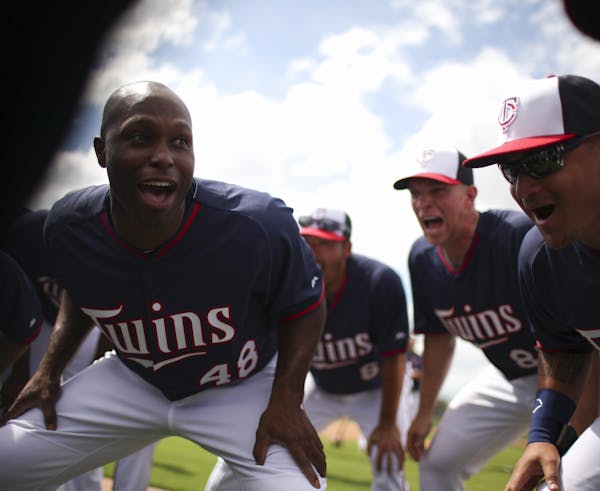The Twins clubhouse was all but empty one February afternoon during spring training, most players long since departed after that morning's workout in Fort Myers, Fla. But in the batting cages, Byron Buxton stood at the plate, eyeing a baseball propped up on a batting tee. Aaron Hicks and Torii Hunter sat in folding chairs just a few feet away, Hicks waiting his turn, Hunter listening as Buxton explained the adjustment to his swing he was trying to master.
A couple of days later, same thing. Later that week, another batting cage session. Hunter interrupted once to shoo away a cameraman recording the scene, but mostly the trio of outfielders worked quietly, with occasional bursts of laughter.
The extra work, Hunter said, is only partly about swings and strides and strike zones. Mostly, it's about letting the up-and-comers absorb how much work goes into being a successful major leaguer.
"The most important thing I can give these guys is my time," Hunter said. "That's what Kirby [Puckett, Hunter's mentor] did for me. … I tell stories, but mostly I listen, and answer questions."
Hunter is being paid $10.5 million by the Twins to hit home runs and catch fly balls this season, but there is presumed to be a little extra value in there, too. Hicks and Buxton are prominent black prospects in an organization that has only a few, and Hunter has bonded with them and committed himself to helping them. In fact, so widespread is the notion that Hunter was brought back to his first big league home to provide clubhouse leadership, General Manager Terry Ryan recently felt compelled to insist that the signing was baseball-first.
"He's a good role model for some of the young guys, and we anticipate that they'll benefit from his presence," Ryan said. "But we wouldn't have signed him if we didn't think he would be a useful righthanded bat and outfielder."
However, leadership is an important — if elusive — quality. The best teams have it, whether in ownership, at the general manager's desk, in the dugout or on the field itself. And some teams notice it more when it's absent. The Twins once had influential voices in uniform, such as Michael Cuddyer, Justin Morneau and Johan Santana, but the transition to younger players created something of a void in the clubhouse.
The Tigers worry they will feel a similar absence this year, now that Hunter is gone. "Torii was tremendous in the clubhouse," Detroit manager Brad Ausmus told reporters this spring. "He was a tremendous asset for me because he could calm the guys down if he thought they were getting tense. He had a way about him that carried weight in the clubhouse, and we'll miss that."
Paul Molitor figures to benefit from it, as he leads a team for the first time. The new Twins manager intends to lead by paying attention to details, by correcting mistakes and by holding players accountable.
The Twins' leadership starts with Ryan, who is proof that sometimes command is defined not by action but by the willingness to avoid it. Ryan has resisted the temptation to swap his team's best prospects for short-term help, however much it's needed, choosing to endure the criticism inherent in four consecutive 90-loss seasons in hopes of delivering a stronger future. He might be right about the collection of young talent, but there are no guarantees.
"We've chosen to trust our own judgment, our scouts," Ryan said. "Nobody likes losing, but you have to have a little patience, too."
